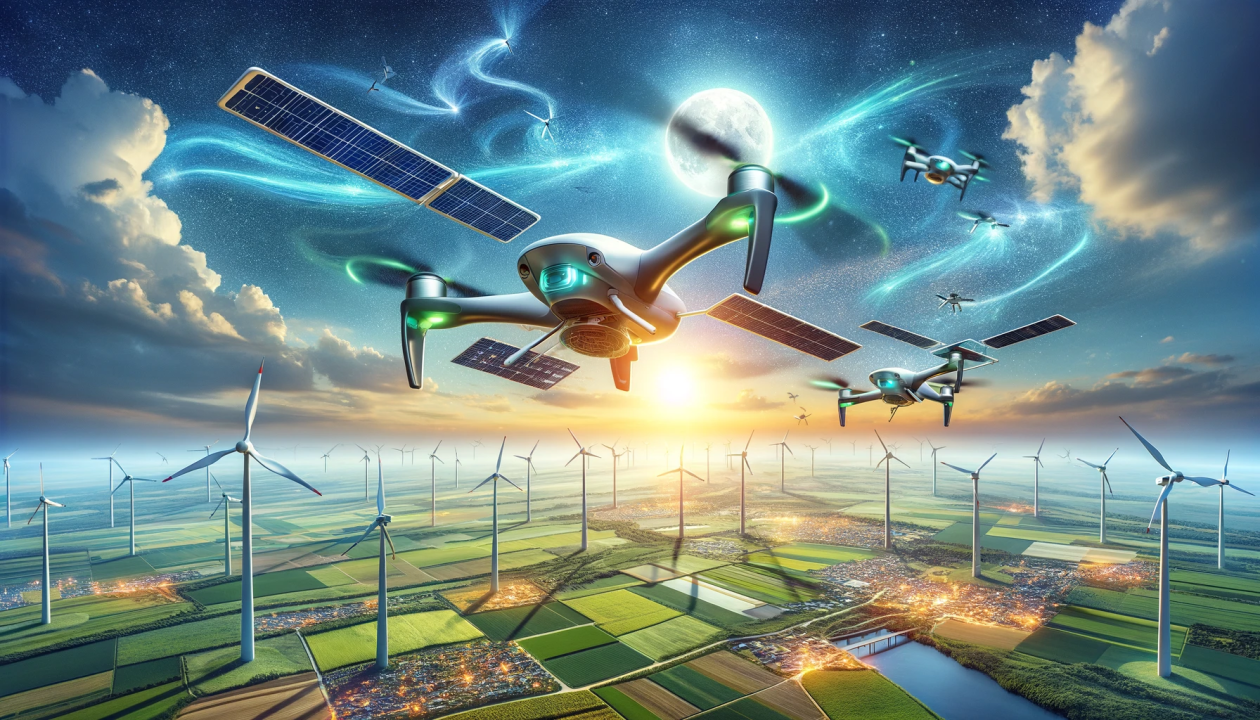Types of Industries Harnessing Drone Technology
In recent years, drone technology has rapidly transformed various industries, providing new ways to optimize operations, reduce costs, and improve data accuracy. From agriculture to entertainment, drones have made a significant impact, and with the continuous rise in drone app development, their influence is only growing. As app development companies create more sophisticated software for drones, their applications continue to expand across multiple sectors.
In this blog, we will explore the types of industries harnessing drone technology and how they are benefiting from its advancements.
Types of Industries Harnessing Drone Technology
1. Agriculture
One of the earliest adopters of drone technology, the agriculture industry uses drones for precision farming, allowing farmers to monitor crop health, irrigation needs, and soil conditions in real time. Drone-based sensors can capture data on plant growth and health, identify areas that require attention, and even spray fertilizers and pesticides with pinpoint accuracy.
With the help of drone app development, farmers can access detailed analytics and forecasts from their smartphones or tablets, helping them make data-driven decisions. Drones also offer faster and more cost-effective ways to assess large farmlands than traditional ground-based inspections.
Key benefits of drones in agriculture:
- Improved crop health monitoring
- Efficient land surveys and mapping
- Precision spraying of fertilizers and pesticides
- Reduced manual labor
2. Construction
The construction industry is another sector where drone technology is making waves. Construction companies use drones to survey sites, monitor progress, and inspect infrastructure. Drone-captured aerial images and 3D mapping provide a comprehensive view of the project, allowing for accurate planning, tracking, and quality control.
App development companies are enabling construction teams to access real-time data from drones, improving communication and reducing delays. Drones can fly over construction sites, capturing high-resolution images that can be transformed into 3D models, ensuring that teams can keep track of progress and stay ahead of any potential issues.
Drones in construction provide:
- Efficient site surveys and inspections
- Real-time progress tracking
- Detailed 3D models and mapping
- Reduced risk in dangerous work zones
3. Energy and Utilities
Drones are proving to be invaluable tools in the energy sector, especially for utility companies managing infrastructure such as power lines, pipelines, and solar farms. With drone technology, energy companies can conduct faster and safer inspections, minimizing human involvement in dangerous or hard-to-reach locations.
Equipped with sensors and high-definition cameras, drones can inspect wind turbines, solar panels, and oil rigs for damage or wear. Through advanced drone app development, technicians can analyze inspection results, monitor assets remotely, and schedule maintenance activities without having to physically visit sites, reducing costs and increasing efficiency.
Advantages of drone use in energy and utilities:
- Safe inspections in hazardous environments
- Real-time damage detection
- Reduced operational downtime
- Enhanced asset monitoring
4. Real Estate
The real estate industry has been quick to embrace drone technology for marketing and property inspections. Drones allow real estate agents and property developers to capture stunning aerial footage and 3D tours of properties, giving potential buyers a comprehensive view of the location and surroundings.
Moreover, real estate developers can use drones for land surveying and topographic mapping, providing accurate data for planning future developments. Real estate app development companies are creating specialized platforms for drones, enabling agents to easily share videos and images with clients, and making property showcases more interactive and engaging.
Real estate drones offer:
- Aerial property photography and videography
- Detailed 3D virtual property tours
- Land surveying and topographic mapping
- Enhanced marketing and promotional material
5. Emergency Services
Emergency services like firefighting, search and rescue, and disaster response are increasingly using drones to aid in their operations. Drones can quickly cover large areas in disaster-stricken zones, providing real-time aerial views that help emergency responders assess damage, locate victims, and coordinate relief efforts.
With drone app development specifically tailored for emergency services, first responders can receive live video feeds and data from drones to improve their situational awareness and response times. In wildfire situations, drones can be deployed to monitor the spread of fires in real time, while drones equipped with thermal cameras can detect heat signatures during search and rescue missions.
Key applications of drones in emergency services:
- Real-time monitoring of disaster areas
- Search and rescue operations
- Firefighting surveillance and management
- Assessment of structural damage
6. Media and Entertainment
The media and entertainment industry has seen a surge in drone usage for filmmaking, news coverage, and event broadcasting. Drones can capture high-quality aerial footage, providing new and innovative perspectives that were previously only achievable with expensive helicopter rentals.
Whether it’s for a live sports event or a feature film, drone operators can use drone app development platforms to control cameras, track subjects, and capture the perfect shot. These drones have become a crucial tool for filmmakers and broadcasters, providing flexibility and creativity at a fraction of the cost of traditional aerial methods.
Drones in media and entertainment provide:
- High-quality aerial cinematography
- Cost-effective event broadcasting
- New creative angles for film and photography
- Live news coverage in hard-to-reach locations
7. Logistics and Delivery
The logistics and delivery industry is on the cusp of a major transformation, with drones poised to revolutionize how goods are transported. Companies like Amazon and UPS are experimenting with drone delivery systems to transport packages directly to consumers, bypassing traditional road networks and reducing delivery times.
As drone delivery becomes more mainstream, app development companies are creating solutions that allow users to track their packages in real time and interact with drone delivery systems. These apps also facilitate communication between drone operators and delivery recipients, ensuring the process is smooth and efficient.
Benefits of drones in logistics and delivery:
- Faster and more efficient package delivery
- Real-time tracking of shipments
- Reduced transportation costs
- Decreased road congestion and emissions
8. Environmental Conservation
Drone technology is being utilized by environmental organizations to monitor and protect ecosystems and wildlife. Drones can survey large, remote areas, allowing conservationists to track animal populations, assess deforestation, and monitor environmental changes due to climate change.
Conservation efforts are benefiting from drone app development platforms that enable researchers to gather and analyze data efficiently. Drones equipped with cameras and sensors can capture aerial footage of hard-to-reach areas, providing invaluable insights into biodiversity, forest health, and natural disaster recovery.
Environmental benefits of drone technology:
- Wildlife population tracking
- Forest health monitoring
- Surveying remote areas for environmental research
- Monitoring climate change impact
9. Security and Surveillance
The security industry is increasingly relying on drones for surveillance, crowd monitoring, and perimeter protection. Drones equipped with high-definition cameras and thermal sensors can provide real-time aerial views of large areas, making them valuable tools for private security firms, law enforcement, and event organizers.
Drones can also be used to patrol large facilities such as airports, power plants, and borders, providing continuous surveillance without the need for ground-based personnel. App development companies are creating integrated drone security solutions that allow operators to monitor and control multiple drones simultaneously, improving response times and security coverage.
Drones in security and surveillance offer:
- Enhanced monitoring of large areas
- Real-time threat detection and response
- Reduced need for ground-based patrols
- Cost-effective security solutions
Conclusion
As drone technology continues to evolve, its applications across various industries are becoming more sophisticated and impactful. With the advancement of drone app development, businesses can harness the full potential of drones to improve efficiency, reduce costs, and gather crucial data. Industries like agriculture, construction, energy, and real estate are just a few examples of how drones are revolutionizing traditional operations.
App development companies play a critical role in this transformation by creating tailored solutions that allow industries to leverage drone technology in more dynamic and effective ways. As more businesses adopt drones, the future promises even more exciting innovations and opportunities across multiple sectors.
FAQs
1. How are drones used in agriculture?
Drones in agriculture are used for precision farming, crop monitoring, land surveying, and precision spraying, helping farmers make data-driven decisions.
2. What industries benefit the most from drone technology?
Industries such as agriculture, construction, real estate, energy, logistics, and security are currently benefiting the most from drone technology.
3. How does drone technology improve safety in the energy sector?
In the energy sector, drones provide safe inspections of infrastructure like power lines and wind turbines, reducing the need for personnel to work in hazardous environments.
4. What role do app development companies play in drone technology?
App development companies create customized platforms that allow users to control drones, analyze data, and access real-time insights, expanding the possibilities of drone applications across industries.







